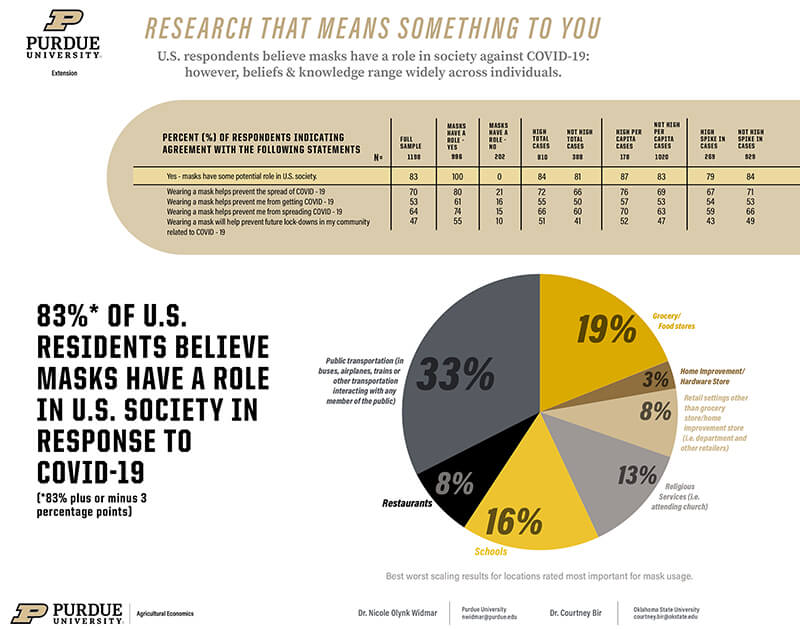July 22, 2020
Majority agree masks have a role in US response to COVID-19
 Majority agree masks have a role in U.S. response to COVID-19
Download image
Majority agree masks have a role in U.S. response to COVID-19
Download image
WEST LAFAYETTE, Ind. – Researchers from Purdue University and Oklahoma State University’s agricultural economics departments conducted a nationally representative survey of 1,198 U.S. residents to understand beliefs and knowledge regarding the role of masks in relation to the spread of COVID-19, as well as perceptions of the most important places to wear a mask.
More than three-quarters (83%) of those surveyed said they believe masks should play a role in the U.S. response to COVID-19 and rated public transportation, grocery/food stores and schools as the most important locations for mask usage.
“We’re still in the beginning of understanding what U.S. residents see as the role for masks in reopening society, as well as why they do or do not comply,” said Nicole Olynk Widmar, professor and associate department head of agricultural economics at Purdue and co-author of the study.
Even as a majority of the respondents in this study agreed that masks have a role in the COVID-19 response, their knowledge and beliefs of mask usage varied. Respondents were asked whether they “agree” with the following mask-related statements: It helps prevent the virus from spreading (70%); it helps prevent me from getting the virus (53%); it helps prevent me from spreading the virus (64%); and it will help prevent future lockdowns in my community related to COVID-19 (47%).
The study uncovered that residents of states with high total case counts prior to data collection more often agreed that mask wearing would prevent them from spreading COVID-19 (66% versus 60 %) and prevent future lockdowns (51% versus 41%). Residents of states spiking in case counts in the month of June more often disagreed with mask usage for most of the statements evaluated.
“The purpose of this study was to begin distinguishing between the different beliefs and hopefully open the door to crafting meaningful communications related to mask usage,” said, Courtney Bir, assistant professor of agricultural economics at Oklahoma State University and co-author on the study. “Understanding why some people choose not wear masks, whether they believe masks have an impact on the spread of COVID-19 or not, is our first step in adding to that conversation.”
The full study, “Societal Values and Mask Usage for COVID-19 Control in the U.S.” is available at https://papers.ssrn.com, and a 2-page reference guide with charts and graphs is available https://purdue.ag/maskusestudy. The full study includes additional questions related to COVID-19’s impact on the respondents’ daily activities as well as childcare/schooling.
Writer: Kami Goodwin, kami@purdue.edu
Sources: Nicole Olynk Widmar, nwidmar@purdue.edu and Courtney Bir, courtney.bir@okstate.edu
Journalists visiting campus: Journalists should follow Protect Purdue protocols and the following guidelines:
- Campus is open, but the number of people in spaces may be limited. We will be as accommodating as possible, but you may be asked to step out or report from another location.
- To enable access, particularly to campus buildings, we recommend you contact the Purdue News Service media contact listed on the release to let them know the nature of the visit and where you will be visiting. A News Service representative can facilitate safe access and may escort you on campus.
- Wear face masks inside any campus building. Wear face masks outdoors when social distancing of at least six feet is not possible.
Agricultural Communications: 765-494-8415;
Maureen Manier, Department Head, mmanier@purdue.edu

